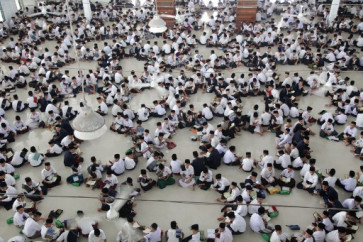Popular Reads
Top Results
Can't find what you're looking for?
View all search resultsPopular Reads
Top Results
Can't find what you're looking for?
View all search resultsSeeing Islam as a religion of compassion and mercy
The opening words of the Quran and all surah (chapters), with the exception of surah al-Tawbah, begin with the invocation: In the name of God, the compassionate, the merciful.
Change text size
Gift Premium Articles
to Anyone
I
n recent years, I have not seen many portrayals of the true, beautiful face of Islam in the public sphere. The dominant public image of Islam, especially in the city of Jakarta, is one of anger and hatred.
It is so unfortunate that Islam has been morphed into a religion of hatred that motivates its believers to engage in brutal prejudice, not only against fellow Muslims but also, and more dangerously, against people of different religions. A sense of growing prejudice, rage and hatred among many urban fundamentalist Muslims has indeed taken place in Indonesia.
In the final days of Ramadan, I am seeking to reclaim the beautiful, true face of Islam that has been largely overshadowed by the ugly practices of fundamentalist Muslims. The struggle for the soul of Islam emerges from a countering belief that the true nature of Islam is one of compassion and mercy.
In my endeavor to argue for the case of Islam as a religion of compassion, I take a brief look at the most compelling sources of Islamic messages for compassion and mercy: the Quran, the hadiths and the early multivocal traditions of Islam.
The Quran is certainly the most authoritative reference to speak precisely of Islam as a religion of compassion and mercy. The opening words of the Quran and all surah (chapters), with the exception of Surah al-Tawbah, begin with the invocation: “In the name of God, the Compassionate, the Merciful”.
This invocation is a great reminder for all Muslims, especially those filled with anger and hatred, to fully embrace the true nature of both divine epithets, al-Rahman (the compassionate) and al-Rahim (the merciful).
In well-known verses of the Quran, God Himself reveals His compassion and mercy to His servants by saying, “I visit My punishment on whomever I will, but My mercy embraces all things” (Surah al-A’raf verse 156); “‘And to those who commit evil deeds, but repent thereafter and believe,’ thus God spoke, ‘indeed, after that, your Lord shall be all-forgiving, all-merciful,’” (Surah al-A’raf verse 153) and in the hadith Qudsi (divine sayings not included in the Quran), where God says “Verily, My compassion and mercy prevail over my wrath,” (Sahih al-Bukhari verse 518).



















